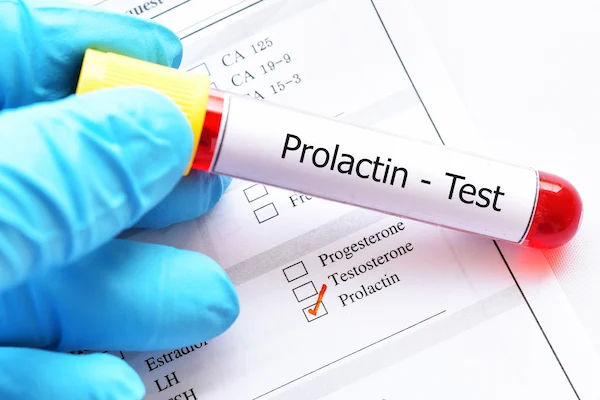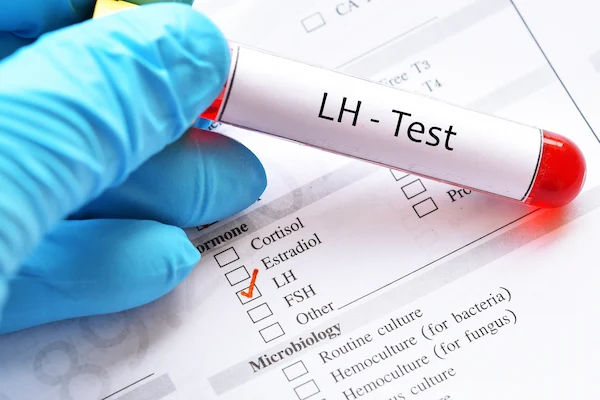The Complete Guide to Female Fertility Hormones: FSH, LH, Estradiol & Prolactin
Learn about four key fertility hormones—FSH, LH, Estradiol, and Prolactin—and how they impact ovulation, menstrual cycles, and fertility. This guide explains their role, test timing, and how Apollo 24|7 supports your reproductive health.

Written by
Last updated on 6th Aug, 2025

The journey to parenthood can be both exciting and challenging for many women. Whether you are trying to conceive, exploring fertility options, or simply wanting to understand your reproductive health better, knowing how your hormones work is essential. These hormones play a vital role in controlling your menstrual cycle, triggering ovulation, and supporting fertility.
This guide will explain the four main hormones involved in female fertility: Follicle-Stimulating Hormone (FSH), Luteinising Hormone (LH), Estradiol (E2), and Prolactin. It will also cover what their levels mean and why hormone testing is an important part of managing your fertility health.
Understanding the Key Hormones That Affect Female Fertility
If you’re trying to get pregnant or dealing with irregular periods or other signs of a possible hormone imbalance, checking your fertility hormones can give you some real answers. These hormones play a big role in how your menstrual cycle works, when you ovulate, and your overall reproductive health.
Here’s a closer look at the four main hormones that play an essential role in female fertility:
1. Follicle-Stimulating Hormone (FSH)
As its name suggests, Follicle-Stimulating Hormone (FSH) is a crucial player in your menstrual cycle. Produced by the pituitary gland in your brain, FSH's primary role is to stimulate the growth and development of follicles in your ovaries. Each follicle contains an immature egg.
What it does: In the early part of your menstrual cycle (the follicular phase), FSH encourages several follicles to grow. As these follicles mature, they begin to produce oestrogen. Usually, only one dominant follicle fully matures and releases an egg during ovulation.
What your levels mean:
High FSH levels: Can mean that your ovaries aren’t responding properly to signals from your brain. This often happens as you approach menopause or if you have premature ovarian insufficiency. In response, your pituitary gland produces more FSH to try to stimulate the ovaries, which leads to higher FSH levels in your test results.
- Low FSH levels: May suggest a problem with the pituitary gland or hypothalamus, which could be affecting ovarian function.
- Normal FSH levels: Typically signify healthy ovarian function and a good response to pituitary signals.
When is it tested? FSH is typically tested on day 2 or 3 of your menstrual cycle, as levels are most indicative of ovarian reserve during this early follicular phase.
Schedule an Assessment and Get Your Health Checked
2. Luteinising Hormone (LH)
Luteinising Hormone (LH) is another vital hormone produced by the pituitary gland, working in close concert with FSH. While FSH focuses on follicle growth, LH takes centre stage just before ovulation.
What it does: Around the middle of your menstrual cycle, a surge in LH triggers the final maturation of the dominant follicle and its rupture, leading to the release of the mature egg – a process known as ovulation. After ovulation, LH also helps to transform the ruptured follicle into the corpus luteum, which then produces progesterone to prepare the uterus for pregnancy.
What your levels mean:
- LH Surge: A sudden, significant increase in LH is the strongest indicator that ovulation is imminent, usually occurring within 24-36 hours of the surge. This is why LH ovulation predictor kits are widely used by women trying to conceive.
- High LH levels (outside of ovulation): Can be a sign of Polycystic Ovary Syndrome (PCOS), where persistently high LH levels can disrupt ovulation.
- Low LH levels: Similar to FSH, low LH could indicate issues with the pituitary gland or hypothalamus, impacting ovulation.
- Normal LH levels: Fluctuate throughout the cycle as expected, with a clear surge preceding ovulation.
When is it tested? LH can be tested throughout the menstrual cycle. A baseline test is often done on day 2 or 3 with FSH, but tracking LH levels daily in the mid-cycle is crucial for pinpointing ovulation.
3. Estradiol (E2)
Estradiol (E2) is the most potent and important form of oestrogen produced by the ovaries. It plays a pivotal role in preparing your body for pregnancy and maintaining overall reproductive health.
What it does: As follicles grow under FSH stimulation, they produce increasing amounts of estradiol. Estradiol is responsible for thickening the lining of your uterus (endometrium) to make it receptive to a fertilised egg. It also plays a crucial role in regulating FSH and LH production, providing feedback to the pituitary gland.
What your levels mean:
- Rising Estradiol levels: Indicate healthy follicular development and that the body is preparing for ovulation.
- High Estradiol levels (early follicular phase): Could suggest the presence of ovarian cysts or an overly aggressive response to fertility medications. Sometimes, high estradiol can suppress FSH, giving a misleading impression of ovarian reserve.
- Low Estradiol levels: May indicate poor ovarian function, premature ovarian insufficiency, or issues with the pituitary gland. It can also be low during menopause.
- Normal Estradiol levels: Fluctuate appropriately throughout the menstrual cycle, peaking just before the LH surge.
When is it tested? Estradiol is commonly tested on day 2 or 3 of the menstrual cycle, often alongside FSH, to assess ovarian reserve and function. It's also monitored during fertility treatments to track follicle growth.
4. Prolactin
Prolactin is a hormone primarily associated with breast milk production (lactation). However, it also has a significant, albeit indirect, role in female fertility, even when you are not pregnant or breastfeeding.
What it does: While its main function is related to lactation, elevated prolactin levels outside of pregnancy or breastfeeding can interfere with the normal production of other fertility hormones, specifically GnRH (Gonadotropin-Releasing Hormone) from the hypothalamus, which in turn affects FSH and LH. This can disrupt ovulation and lead to irregular or absent periods.
What your levels mean:
- High Prolactin levels (hyperprolactinemia): Can inhibit ovulation, leading to irregular periods, absence of periods (amenorrhoea), or difficulty conceiving. This can be caused by various factors, including certain medications, stress, an underactive thyroid, or a benign tumour in the pituitary gland (prolactinoma).
- Normal Prolactin levels: Indicate that this hormone is not interfering with your reproductive cycle.
When is it tested? Prolactin can be tested at any time, but ideally, it's recommended to test it in the morning, usually after a night of good sleep, and avoiding strenuous exercise or stress before the test, as these factors can temporarily elevate prolactin levels.
What to Remember Before Your Test
To ensure the most accurate results for your female hormone tests, a few considerations are important:
- Timing is Key: As mentioned, the timing of your test within your menstrual cycle is crucial for FSH and Estradiol. Your doctor will advise you on the best day for your specific tests.
- Medications: Inform your doctor about any medications you are currently taking, including hormonal contraceptives, as they can affect hormone levels. You may be advised to temporarily stop certain medications before the test.
- Stress and Lifestyle: While difficult to completely control, try to minimise stress and avoid strenuous physical activity before your blood sample collection, especially for prolactin tests, as these can influence hormone levels.
- Fasting: Generally, fasting is not required for female hormone tests, but always confirm with the lab or your doctor's instructions.
Conclusion
Understanding your fertility hormones is an important part of managing your reproductive health. Whether you are planning to conceive, considering fertility treatment, or simply want to understand your hormonal status, a female hormone test can provide valuable insights. It helps identify any imbalances that may be affecting ovulation or menstrual regularity and guides your doctor in planning the next steps.
With reliable services like Apollo 24|7, getting tested is more accessible than ever. You can book fertility hormone screening tests from home, with the option of home sample collection or visiting a nearby Apollo lab. This convenience, combined with expert diagnostic support, gives you the confidence to take informed steps in your fertility journey.

.webp)
.webp)


